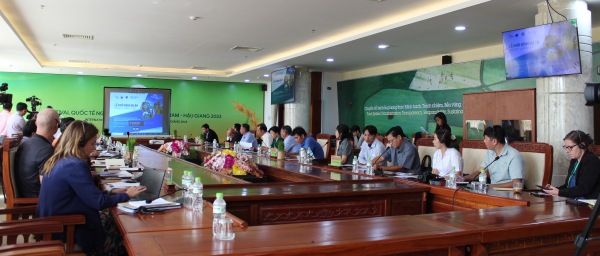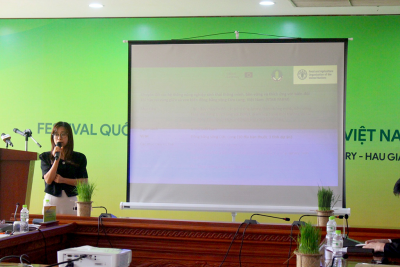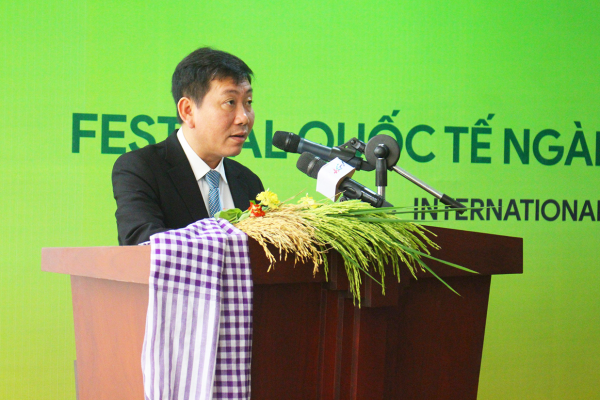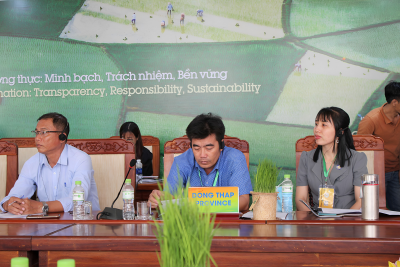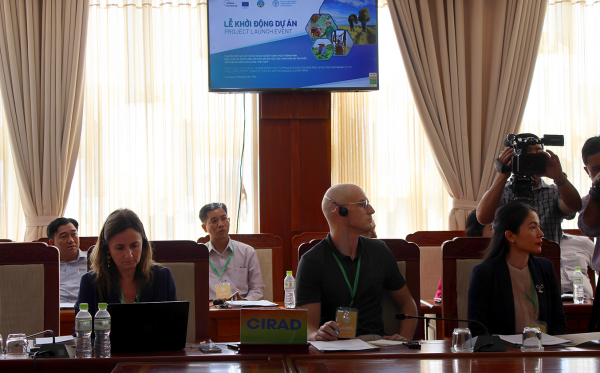- Home
- Worldwide
- Our regional offices
- Continental Southeast Asia
- News : Continental Southeast Asia
- STAR-FARM Kick-off in Vietnam's Mekong Delta
STAR-FARM Project Kick-off Meeting for an Eco-Resilient Agriculture in Vietnam's Mekong Delta

The STAR-FARM kick-off meeting was organized against the backdrop of the International Rice Festival in Hau Giang province © L. Vo, CIRAD
Organized by the Ministry of Agriculture and Rural Development (MARD) of Vietnam, with funding from the European Union (EU), and implemented by the Food and Agriculture Organization of the United Nations (FAO), this collaborative project aims to transform the Mekong Delta's farming practices. The essential contributions from CIRAD, the project's scientific partner, and other key partners such as the French National Research Institute for Sustainable Development (IRD), the Institute of Policy and Strategy for Agriculture and Rural Development, and other research institutes and universities in Vietnam are central to the initiative. Against the backdrop of the International Rice Festival, the kick-off meeting highlights the project's deep connection to the region's agricultural traditions and economic development.
The "Smart Agroecological Transformation of Farming Systems towards Resilience and Sustainability in Middle and Coastal Zones of the Viet Nam Mekong Delta" (STAR-FARM) project, is organized by the Ministry of Agriculture and Rural Development (MARD) of Vietnam, with funding from the European Union (EU) and implementation done by the Food and Agriculture Organization of the United Nations (FAO)
The kick-off meeting for the STAR-FARM project was marked by the presence of notable figures and representatives, underscoring the project's significance and collaborative nature. Among the key attendees were Mr. Nguyễn Đỗ Anh Tuấn, Head of the International Cooperation Department at MARD, Mr. Roberto Ruiz, First Counsellor of the EU Delegation to Vietnam, Ms. Marion Chaminade, agricultural counselor of the French Embassy, and Mr. Nguyen Hong Son, president of the Vietnamese Academy of Agricultural Science, highlighting the strong support from both national and international bodies. The scientific community was represented by the attendance of CIRAD, IRD, the University of Can Tho, and other development partners. Local leaders from the participating provinces of Dong Thap, Kien Giang, Tra Vinh, and the host province, Hau Giang, were also present.
The EU is committed to supporting this new initiative to promote the smart agro-ecological transformation of farming systems towards increased resilience in the Mekong Delta. This transformation is complex and prices and competitiveness should be navigated strategically, but it presents a huge economic opportunity, particularly for Vietnam. We are pleased to join MARD, provincial leaders, FAO, and project partners to launch this EU-funded initiative, also in the great spirit of the international rice festival in Hau Giang province.
Blueprint for Change: Tackling Climate Challenges in Mekong Delta
The STAR-FARM project is a comprehensive program that addresses the urgent need for sustainable agricultural practices in the face of climate change and environmental challenges. With €4.15 million funding from the EU, the project is set to unfold over four years, focusing on Dong Thap, Kien Giang, and Tra Vinh provinces. These provinces have been chosen based on rigorous selection criteria designed by the FAO.
In her project overview, Dr. Pham Thanh Thuy, STAR-FARM's coordinator, FAO, discussed the Mekong Delta's primary challenge of environmental degradation due to intensive farming practices. This issue has led to soil depletion, reduced ecological services, and lower resilience to climate change. Barriers such as lack of access to credit and limited knowledge of sustainable and technological innovations are also being tackled to ensure the widespread adoption of eco-friendly agricultural models and practices.
The STAR-FARM project aligns closely with broader regional and national goals. Specifically, the project supports the strategic directives outlined in Resolution 13 of the Political Bureau, which focuses on the Mekong Delta region's socio-economic development, defense, and security. This resolution sets a clear trajectory for the region's progress until 2030 and lays out a vision extending to 2045. By integrating these objectives, STAR-FARM contributes to sustainable agricultural practices and the overall long-term development and stability of the Mekong Delta, ensuring that its agricultural advancements are in harmony with Vietnam's broader strategic and developmental ambitions.
The results of the project will contribute to implementing the Government's policies on sustainable development in the Mekong Delta, adapting to climate change.
Charting the Course: Objectives and Strategies of the STAR-FARM Project
The project kick-off meeting highlighted STAR-FARM's three primary objectives:
- Policy Support for Sustainable Systems: To promote equitable and environment-friendly food production, addressing intensive farming's ecological consequences.
- Development of Ecological Agricultural Value Chains: Aiming to introduce and expand innovative and sustainable agricultural practices.
- Enhancing Adaptive Capacities: Strengthening the resilience of stakeholders in agricultural value chains against environmental and climate challenges.
CIRAD's Mission: Driving Policy and Value Chain Transformation in STAR-FARM
STAR-FARM's approach is multifaceted, integrating various aspects of the agricultural ecosystem:
- Eco-Agricultural Practices: Emphasizing ecological balance, including biodiversity conservation and eco-friendly fertilization methods.
- Public-Private Partnerships: Encouraging collaboration between public institutions, private entities, and local communities.
- Landscape Approach: Managing natural resources and agricultural practices holistically to ensure sustainability and resilience.
"In this project, we intend to test how innovative agro-ecological practices could impact ecosystem functioning and food production in the Mekong delta. Indications drawn from our experiments would guide the implementation of technical and institutional innovation aiming at fostering more resilient agro-ecosystems facing climate change," explains Dr. Pierre Lefeuvre of the STAR-FARM project team, CIRAD.
As the project's scientific partner, CIRAD is set to contribute significantly in two key areas.
CIRAD is the focal point in policy support for sustainable food systems. This role involves aiding the implementation of policies that promote equitable and environmentally conscious food production. To achieve this, CIRAD conducts comprehensive assessments of stakeholders and agricultural value chains, identifying specific needs and gaps. Additionally, CIRAD focuses on building the capacities of both public and private entities involved in the project. This ensures that all parties are well-prepared and equipped to successfully execute the STAR-FARM initiative.
Furthermore, CIRAD is poised to lead in developing sustainable agricultural value chains. The focus will be on introducing and fostering innovative farming practices and technologies, with exceptional support for vulnerable groups such as women and youth, helping them to engage effectively with new agricultural technologies and solutions. CIRAD also aims to promote and disseminate sustainable standards and agroecological methods, contributing to the broader adoption of environmentally sustainable agriculture practices. These planned efforts align with CIRAD's commitment to fostering sustainable agricultural development in the Mekong Delta region.
With its innovative approach and the collaborative effort of partners like CIRAD, FAO, and local Vietnamese institutions, the STAR-FARM project marks a significant step toward a sustainable future for Vietnam's Mekong Delta.

























